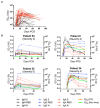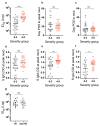Longitudinal observation and decline of neutralizing antibody responses in the three months following SARS-CoV-2 infection in humans
- PMID: 33106674
- PMCID: PMC7610833
- DOI: 10.1038/s41564-020-00813-8
Longitudinal observation and decline of neutralizing antibody responses in the three months following SARS-CoV-2 infection in humans
Abstract
Antibody responses to SARS-CoV-2 can be detected in most infected individuals 10-15 d after the onset of COVID-19 symptoms. However, due to the recent emergence of SARS-CoV-2 in the human population, it is not known how long antibody responses will be maintained or whether they will provide protection from reinfection. Using sequential serum samples collected up to 94 d post onset of symptoms (POS) from 65 individuals with real-time quantitative PCR-confirmed SARS-CoV-2 infection, we show seroconversion (immunoglobulin (Ig)M, IgA, IgG) in >95% of cases and neutralizing antibody responses when sampled beyond 8 d POS. We show that the kinetics of the neutralizing antibody response is typical of an acute viral infection, with declining neutralizing antibody titres observed after an initial peak, and that the magnitude of this peak is dependent on disease severity. Although some individuals with high peak infective dose (ID50 > 10,000) maintained neutralizing antibody titres >1,000 at >60 d POS, some with lower peak ID50 had neutralizing antibody titres approaching baseline within the follow-up period. A similar decline in neutralizing antibody titres was observed in a cohort of 31 seropositive healthcare workers. The present study has important implications when considering widespread serological testing and antibody protection against reinfection with SARS-CoV-2, and may suggest that vaccine boosters are required to provide long-lasting protection.
Conflict of interest statement
The authors declare no competing interests.
Figures





References
-
- Gorse GJ, Donovan MM, Patel GB. Antibodies to coronaviruses are higher in older compared with younger adults and binding antibodies are more sensitive than neutralizing antibodies in identifying coronavirus-associated illnesses. J Med Virol. 2020;92:512–517. doi: 10.1002/jmv.25715. - DOI - PMC - PubMed
-
- Luchsinger LL, et al. Serological Analysis of New York City COVID19 Convalescent Plasma Donors. medRxiv. 2020 doi: 10.1101/2020.06.08.20124792. - DOI
Publication types
MeSH terms
Substances
Grants and funding
LinkOut - more resources
Full Text Sources
Other Literature Sources
Medical
Miscellaneous

